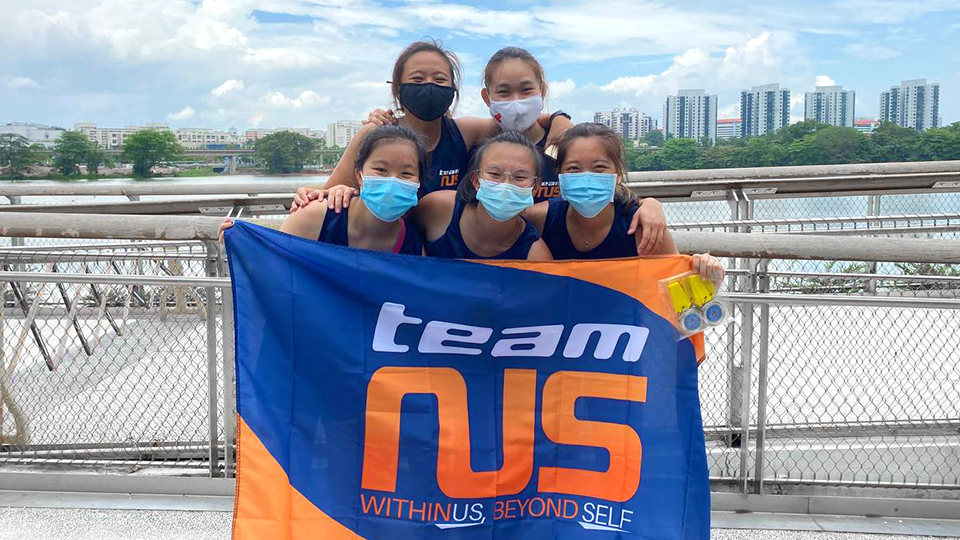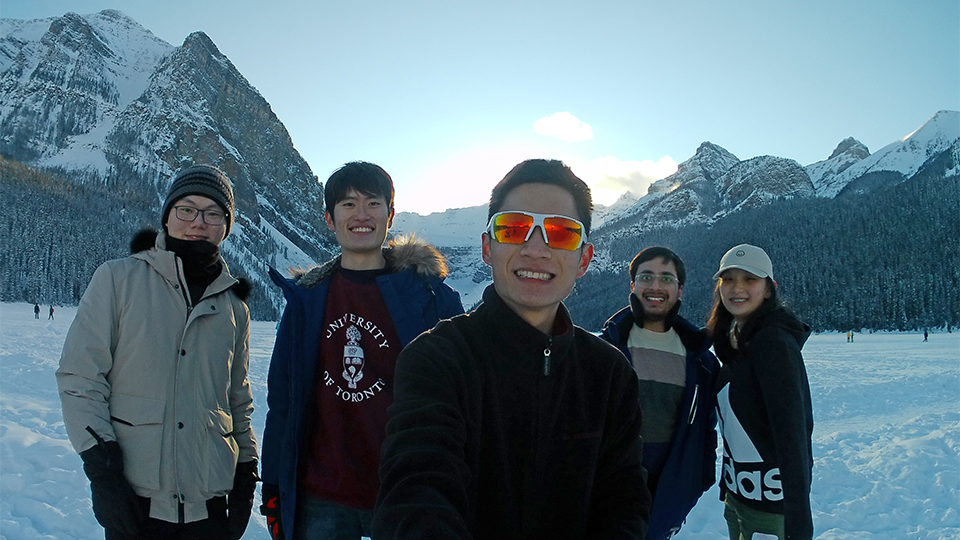Whitney would be the first to admit that she had no idea what she wanted to do after graduating from Junior College. As a playful and curious person, however, she was keen on pursuing a field that would tap on her innate curiosity to explore the worlds of maths and science.
After much research, Whitney landed on what she felt was the best of both worlds: NUS’ Engineering Science Programme (ESP) at the College of Design and Environment (CDE), which offers an engaging and multidisciplinary approach to these two complex subjects. In this field, hands-on experience and the ability to try, fail and try again are all highly encouraged.
“I'm learning how to think critically about something that may change as time goes on. It's not just a class — it's an experience!”
Where Engineering meets Science
A frequent question Whitney gets asked is if she considers herself an engineer or a scientist. Whitney sees herself as both.
In fact, the programme takes the defining traits from the two subjects and combines them into something distinct and unique.
Engineering Science opened Whitney’s eyes to its integrative field that combines fundamental engineering principles, mathematics and sciences to solve problems in the real world.
“It was really interesting because I get to experience first-hand how different fields work together and to solve complex multidisciplinary challenges across industries like medicine, energy, the environment and more.”
Looking back, Whitney recalls her first and second year with great fondness. During this time, she had learnt all about the fundamental science and engineering courses such as linear algebra and engineering principles in-action — all of which provided a strong foundation for her current courses.
She reminisces about one particularly hands-on project, where she and her classmates were tasked to build an earthquake-resistant tower: “We had a lot of freedom in designing our towers and the best part was having fun experimenting with different materials, shapes and structures,” she recalls.
For another project under the core class Major Design Project 1, Whitney and her team were tasked to solve a real-world problem by using image recognition to track objects. The team joined heads to tackle a common problem with a novel approach: constructing a cockroach catcher!
“Instead of dismissing our idea, the lecturers gave us direction on how we could approach it and they were very encouraging,” Whitney remembers.
She excitedly recalls how these group projects were then turned into mini competitions, further injecting the important element of fun and healthy competition in their learning.
She also shared how she was both challenged and fascinated by her second-year core courses such as Applied Quantum Physics, which teaches students how atoms and subatomic particles behave. “It’s overwhelming at first but it’s really fascinating the more you learn about it, and employers are impressed that we are exposed to this at just Year 2.”
As part of the programme, Whitney had to choose a specialisation in her third year. Wanting to use her knowledge to enact positive change in society, Whitney ultimately decided to specialise in Engineering Science in Medicine. To complement her specialisation, she also chose to do a second major in Management at NUS Business School, and a minor in Physics at NUS Faculty of Science.
Given that ESP instructors have varied backgrounds — they could be electrical, mechanical or materials engineers, or physicists — the students also benefit from their breadth of research experiences and passion for mentoring.
Whitney credits one lecturer in particular, who has impacted her life beyond her studies.
“As a fellow woman in STEM (Science, Technology, Engineering, and Mathematics), someone I really look up to is Professor Ho Ghim Wei. Beyond her commitment and success in research, she’s very supportive of a vibrant student life. She’s both an inspiration and a role model.”
Illuminating new innovations
In her younger years, Whitney was exposed to some of the invasive procedures that those close to her had to go through as part of their medical treatments. Struck by how much these treatments could negatively impact one’s well-being, she became inspired to help improve the field through technology. “I want to do my part in creating solutions that are less invasive and risky for patients in the future,” she says.
Her studies at NUS has paved the way for her to conduct research in optical devices specifically in medical imaging. “Everything needs to be smaller so we can take a look inside the body. There is a very real need for imaging on a nano-scale in medicine,” Whitney explains.
Weaving a rich tapestry of experiences
Whitney's time at NUS has been marked by a commitment to learning and personal growth, both inside and outside the classroom.
Whether she's hitting the water with her dragon boat team or representing Eusoff Hall in inter-hall games and dance productions, Whitney is taking full advantage of the opportunities available to her.
 Whitney (first row, centre) with her NUS dragon boat teammates at the Singapore Dragon Boat Association’s Dragon Boat Century Race 2021.
Whitney (first row, centre) with her NUS dragon boat teammates at the Singapore Dragon Boat Association’s Dragon Boat Century Race 2021.
But it's not all fun and games. As a member of the Engineering Science Programme Club, she has also taken an active role in shaping the future of her field and helping fellow students access more opportunities for growth and development.
The ESP Club, for instance, seeks to help students discover their interests and pursue their chosen career paths by organising networking events with seniors and notable alumni, as well as enrichment events in collaboration with other sub-clubs.
Further afield, Whitney recently went on the Student Exchange Programme with six other ESP students to the University of Toronto (UoT) — an experience that has shaped her greatly.
There, she took the opportunity to try ice climbing and snowboarding for the first time despite the freezing Canadian winter, and even went stargazing and ice skating at a frozen lake in Alberta.
The semester in Canada helped Whitney cultivate a strong sense of adventure and independence, which she relished.
 Whitney (back row, first from right) on an ice skating trip with her buddies at Lake Louise, Banff, Alberta.
Whitney (back row, first from right) on an ice skating trip with her buddies at Lake Louise, Banff, Alberta.
Beyond the new experiences gained, Whitney says her biggest takeaway from her semester abroad was a greater appreciation for her school and coursework, noting that the faculty members in UoT had expressed their admiration for NUS and its Engineering Science programme.
“I got to fully enjoy the Student Exchange Programme and it was amazing to meet other students who are just as enthusiastic as I am about engineering science! NUS created such a safe space for me to explore any interest — to try anything and everything. I will miss the student life in NUS when I start working!”
Mapping the road ahead
With her eyes set firmly on the future, Whitney currently intends to pursue further studies, potentially within NUS, in the hope of developing something that can be used in real-life applications so as to give back to the community.
Whitney may be a natural explorer and thrill-seeker, but she credits the Engineering Science Programme for providing much-needed guidance and being a safe space for her to embark on her adventures.
“I don’t know what the future holds but whatever it is, I feel empowered and confident — I feel ready.”